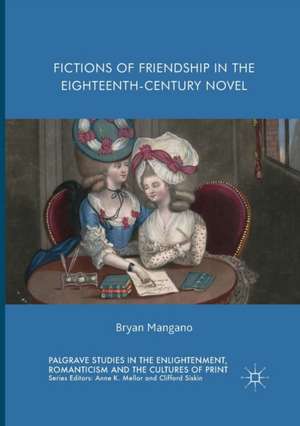Fictions of Friendship in the Eighteenth-Century Novel: Palgrave Studies in the Enlightenment, Romanticism and Cultures of Print
Autor Bryan Manganoen Limba Engleză Paperback – 12 mai 2018
| Toate formatele și edițiile | Preț | Express |
|---|---|---|
| Paperback (1) | 582.30 lei 6-8 săpt. | |
| Springer International Publishing – 12 mai 2018 | 582.30 lei 6-8 săpt. | |
| Hardback (1) | 587.72 lei 6-8 săpt. | |
| Springer International Publishing – 31 iul 2017 | 587.72 lei 6-8 săpt. |
Din seria Palgrave Studies in the Enlightenment, Romanticism and Cultures of Print
- 15%
 Preț: 640.88 lei
Preț: 640.88 lei - 18%
 Preț: 724.63 lei
Preț: 724.63 lei - 15%
 Preț: 699.59 lei
Preț: 699.59 lei -
 Preț: 214.57 lei
Preț: 214.57 lei - 15%
 Preț: 592.44 lei
Preț: 592.44 lei -
 Preț: 387.38 lei
Preț: 387.38 lei -
 Preț: 389.70 lei
Preț: 389.70 lei -
 Preț: 391.61 lei
Preț: 391.61 lei -
 Preț: 387.75 lei
Preț: 387.75 lei -
 Preț: 387.75 lei
Preț: 387.75 lei -
 Preț: 383.93 lei
Preț: 383.93 lei -
 Preț: 387.38 lei
Preț: 387.38 lei - 15%
 Preț: 638.43 lei
Preț: 638.43 lei - 15%
 Preț: 639.41 lei
Preț: 639.41 lei -
 Preț: 386.81 lei
Preț: 386.81 lei -
 Preț: 385.84 lei
Preț: 385.84 lei -
 Preț: 389.88 lei
Preț: 389.88 lei -
 Preț: 214.96 lei
Preț: 214.96 lei -
 Preț: 381.98 lei
Preț: 381.98 lei - 15%
 Preț: 642.51 lei
Preț: 642.51 lei -
 Preț: 384.86 lei
Preț: 384.86 lei -
 Preț: 390.63 lei
Preț: 390.63 lei -
 Preț: 387.20 lei
Preț: 387.20 lei -
 Preț: 389.88 lei
Preț: 389.88 lei - 15%
 Preț: 499.59 lei
Preț: 499.59 lei -
 Preț: 389.70 lei
Preț: 389.70 lei - 15%
 Preț: 701.72 lei
Preț: 701.72 lei -
 Preț: 389.88 lei
Preț: 389.88 lei -
 Preț: 384.31 lei
Preț: 384.31 lei -
 Preț: 385.84 lei
Preț: 385.84 lei -
 Preț: 386.81 lei
Preț: 386.81 lei -
 Preț: 386.81 lei
Preț: 386.81 lei -
 Preț: 382.18 lei
Preț: 382.18 lei -
 Preț: 391.61 lei
Preț: 391.61 lei - 15%
 Preț: 527.79 lei
Preț: 527.79 lei -
 Preț: 388.13 lei
Preț: 388.13 lei
Preț: 582.30 lei
Preț vechi: 685.06 lei
-15% Nou
Puncte Express: 873
Preț estimativ în valută:
111.42€ • 116.65$ • 92.20£
111.42€ • 116.65$ • 92.20£
Carte tipărită la comandă
Livrare economică 05-19 aprilie
Preluare comenzi: 021 569.72.76
Specificații
ISBN-13: 9783319839967
ISBN-10: 3319839969
Pagini: 298
Ilustrații: X, 298 p.
Dimensiuni: 148 x 210 mm
Greutate: 0.37 kg
Ediția:Softcover reprint of the original 1st ed. 2017
Editura: Springer International Publishing
Colecția Palgrave Macmillan
Seria Palgrave Studies in the Enlightenment, Romanticism and Cultures of Print
Locul publicării:Cham, Switzerland
ISBN-10: 3319839969
Pagini: 298
Ilustrații: X, 298 p.
Dimensiuni: 148 x 210 mm
Greutate: 0.37 kg
Ediția:Softcover reprint of the original 1st ed. 2017
Editura: Springer International Publishing
Colecția Palgrave Macmillan
Seria Palgrave Studies in the Enlightenment, Romanticism and Cultures of Print
Locul publicării:Cham, Switzerland
Cuprins
Introduction: "Errant Stuff".- Chapter 1 “Amiable Fictions; or the Pedagogy of Friendship in Enlightenment Media”.- Chapter 2 “Tragedy in Print; or, Epistolary Friendship and Clarissa’s Divided Readership”.- Chapter 3 “The Property of True Friends; or, Paradoxes of Narration in Sarah Fielding’s David Simple”.- Chapter 4 “Institutions of Friendship; or, Anonymous Authorship and Political Economy in Sarah Scott’s Millenium Hall”.- Chapter 5 “Enduring Oddity; or, the Friendship of Fools in Sterne’s Tristram Shandy”.- Chapter 6 “Infernal Fraternity; or, Alienated Readers in Mary Shelley’s Frankenstein”.- Epilogue: The Novel as a Technology of Friendship.
Notă biografică
Bryan Mangano currently lectures at Cornell College in Mount Vernon, Iowa, USA. He has published articles in Eighteenth-Century Fiction and Texas Studies in Literature and Language.
Textul de pe ultima copertă
This book explores the reciprocal influence of friendship ideals and narrative forms in eighteenth-century British fiction. It examines how various novelists, from Samuel Richardson to Mary Shelley, drew upon classical and early modern conceptions of true amity as a model of collaborative pedagogy. Analyzing authors, their professional circumstances, and their audiences, the study shows how the rhetoric of friendship became a means of paying deference to the increasing power of readerships, while it also served as a semi-covert means to persuade resistant readers and confront aesthetic and moral debates head on. The study contributes to an understanding of gender roles in the early history of the novel by disclosing the constant interplay between male and female models of amity. It demonstrates that this gendered dialogue shaped the way novelists imagined character interiority, reconciled with the commercial aspects of writing, and engaged mixed-sex audiences.
Caracteristici
Demonstrates that novelists use both Classical and Enlightenment thinking about friendship to negotiate their relationships to the reading audience Demonstrates the ways novelists mobilize the rhetoric of amity as a framing metaphor of narrative form and reception because of its social import Shows that ideal friendship becomes a central link between the rhetoric and narrative content of early fictions
